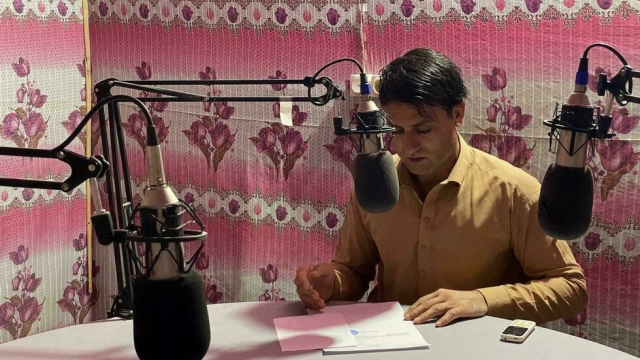Vibrant Afghan radio reduced to religious relic
But when the hardline Islamist Taliban swept to power mid-August, vowing to restore sharia law, everything changed

Radio station Urooj once teemed with journalists producing news bulletins, but since the Taliban came to town, Ebrahim Parhar sits alone, broadcasting hours of religious sermons.
Parhar launched Urooj, which means "The Rising" in Pashto, in the western city of Farah six years ago, carefully selecting a diverse range of programmes for an audience long deprived of media.
"We had religious, political, social, and music programmes," he told AFP, adding that up until two months ago, the station broadcast different programmes for 19 hours a day.
But when the hardline Islamist Taliban swept to power mid-August, vowing to restore sharia law, everything changed.
"Unfortunately, of all the programmes, only one is left, which is religious," said the clean-shaven 35-year-old with short, dark hair and piercing blue eyes, pouring tea at his desk loaded with broadcasting equipment.
"We prepare a playlist in the morning and replay it during the day because there is no live programming."

Marya Sultani said the Taliban's arrival had dashed her dream of becoming a famous journalist in Farah province - AFP
He has had to sack all of his 18 employees, eight of them women.
"We have dismissed them all," he said, pointing out that "all the contracts and advertisements we had are cancelled now".
"If the current situation persists, it is very likely that we will need to close this radio station."
Marya Sultani, a former news anchor at the station, said the Taliban's arrival had dashed her dream of becoming a famous journalist in Farah province.
"That wish came true, and I became a journalist, but now with the return of (the Taliban), everything has come to an end," the 25-year-old, wearing a black shawl over her head, told AFP.
She sat in front of a large microphone in the sound-proofed studio where she used to work, during a visit to see her former colleague.
After working for five years as a journalist, she is now "unemployed and sitting at home", terrified that she might face reprisal attacks for having worked as a journalist.
"I am afraid that someone may harm me," she said.
'Don't feel safe'
The Taliban, notorious for their brutal and repressive rule of the 1990s, had said they would respect women's rights in line with sharia law, but nearly two months in, women have been largely prevented from working.
Press freedom and rights groups have said the Taliban have imposed numerous new rules on journalists, including banning any reports that "are contrary to Islam", "insult public figures" or concern "matters that have not been confirmed by officials".

Ahead of their rapid offensive across the country, the Taliban carried out a wave of targeted killings against public figures, including journalists WAKIL KOHSAR AFP/File
The Afghan Journalists Safety Committee (AJSC) says more than 70 percent of media outlets in the country have closed.
At the same time, large numbers of journalists have either fled the country or gone into hiding, leaving the media landscape in the country at its lowest level in 20 years, according to the AJSC.
Some of those that have continued to work have been detained and beaten when attempting to cover anti-Taliban protests.
Parhar said he was "very worried" for his safety and that of his former colleagues.
"I am worried because some of my employees were threatened before," he said, adding that he too had been "targeted twice before".
Ahead of their rapid offensive during which Taliban militants captured city after city, the group carried out a wave of targeted killings against public figures, including journalists.
Parhar said the authorities had sent him several letters warning that he was "a potential target".
"I don't feel safe now," he said.



















COMMENTS
Comments are moderated and generally will be posted if they are on-topic and not abusive.
For more information, please see our Comments FAQ